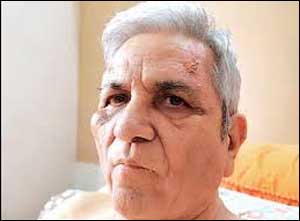- Home
- Editorial
- News
- Practice Guidelines
- Anesthesiology Guidelines
- Cancer Guidelines
- Cardiac Sciences Guidelines
- Critical Care Guidelines
- Dentistry Guidelines
- Dermatology Guidelines
- Diabetes and Endo Guidelines
- Diagnostics Guidelines
- ENT Guidelines
- Featured Practice Guidelines
- Gastroenterology Guidelines
- Geriatrics Guidelines
- Medicine Guidelines
- Nephrology Guidelines
- Neurosciences Guidelines
- Obs and Gynae Guidelines
- Ophthalmology Guidelines
- Orthopaedics Guidelines
- Paediatrics Guidelines
- Psychiatry Guidelines
- Pulmonology Guidelines
- Radiology Guidelines
- Surgery Guidelines
- Urology Guidelines
After accident, blind in left eye, man starts seeing again

A surprising happy turn of an event -A man blind in left eye starts seeing again. This is not a fiction depicted in an Indian movie but what happened in real life.
For a 72-year-old Thane resident Praful Shah a brush with death turned out to be a new year blessing.He had lost vision due to small-pox infection during infancy. He was riding pillion with his nephew when their bike tripped on metro construction material in Mulund. He was admitted to Fortis hospital with multiple fractures and cuts and bruises for which he received treatment. The patient realised that after the accident he could see from his left eye, in which he had lost vision to small-pox as a one-year-old.
The Shah and family consider it to be a miracle but doctors say vision can’t be restored in cases of 100 per cent blindness, so it might be that Shah had never lost sight completely and he was probably never 100% blind.
“The fact that Shah has regained his vision means he was never 100 percent blind in the left eye,” Dr TP Lahane, renowned ophthalmologist from government-run JJ Hospital, told Mirror. Dr Lahane said it’s possible that trauma to Shah’s right eye during the recent accident led to activation of muscles in the left eye, helping the 72-year-old see again. The earlier condition of not being able to see from one eye could, according to Dr Lahane, be a condition called amblyopia, which can result from not being able to focus clearly. Amblyopia, he said, can either be caused by misalignment of the two eyes or decreased vision in one or both eyes due to abnormal development of vision during infancy.
Amblyopia or lazy eye is decreased vision in one or both eyes due to abnormal development of vision in infancy or childhood. In amblyopia, there may not be an obvious problem of the eye. Vision loss occurs because the nerve pathways between the brain and the eye aren't properly stimulated.
According to Dr Lahane, the trauma probably shifted vision from the right eye to left. He said that it’s possible that it will go back to square one after the victim recovers completely from his injuries. Until them, though, Shah and his family are basking in the rare happiness.
The family members of Shah are thanking God and their stars. “Since childhood, my uncle was unable to see from his left eye. When he met with an accident, his right eye was injured and swollen. We got worried and started asking if he could see from his right eye. We were shocked when he said that he can see from his left eye as well,” said Shah’s nephew Mayur, adding that the family thought that he was confused after the accident. “When he insisted, we contacted the doctors who refused to believe us. “It’s been some days now, and he can still see from both the eyes. It is bound to be a miracle,” said Mayur, adding that they have seen Shah pointing to a spider web around the window which wasn’t visible to anyone else.
After discharge from the hospital on Saturday, Shah told Mirror, “In the past 70 years, my parents and I visited several doctors. I put everything behind me. Life must go one, I told myself. It has been a happy accident.”
The American Optometric Association recommends that all children have their first eye exam at 6 months of age, another exam at age 3 and a third exam prior to entering school to ensure the vision is developing normally in both eyes and there is no risk of amblyopia.

Disclaimer: This site is primarily intended for healthcare professionals. Any content/information on this website does not replace the advice of medical and/or health professionals and should not be construed as medical/diagnostic advice/endorsement or prescription. Use of this site is subject to our terms of use, privacy policy, advertisement policy. © 2020 Minerva Medical Treatment Pvt Ltd